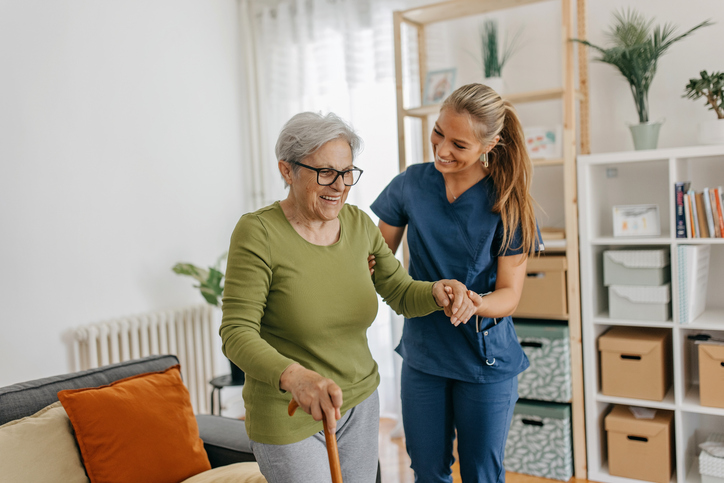Signs It’s Time to Consider Companion Care
Loneliness and feelings of isolation are all too common among older adults. But while senior mental health is a major issue, many families don’t know what to look for and have no idea where to turn when they need support. If you suspect your loved one is struggling with senior isolation, companion care could be the solution. This level of home care goes beyond basic assistance with daily tasks and also provides social interaction and support. Let’s dive deeper into the fundamentals of home care and how to know when your loved one might benefit from companion care services.
What Is Home Care?
Let’s start at the beginning: what is home care? Home care refers to a range of services designed to help individuals (especially older adults) maintain their independence while living safely in their own homes. These services can be medical or non-medical, depending on the person’s specific needs. In the best circumstances, the home care team is made up of several people, all with a genuine interest in the senior’s well-being. A typical home care team includes the following professionals:
- Geriatric/Certified Nursing Assistants & Home Health Aides—Aides assist with personal care tasks such as bathing, dressing, and grooming. They may also help with mobility and provide basic health monitoring.These professionals incorporate Companionship through care planning. Often becoming the primary source of daily interaction and support for older adults. They engage in conversations, play games, assist with light activities, and provide emotional comfort.
- Care Coordinators—This member of the care team oversees the entire care plan and ensures all the services are working together effectively. They may be the main point of contact with families.
- Licensed Nurses—Licensed Nurses provide assessments for all families to develop a plan of care for the caregivers to follow. If the home care service provides skilled nursing, licensed nurses may be hired to administer medication, care for wounds, and perform health assessments.
- Social Workers—Social workers collaborate with family members and older adults to make navigating the healthcare system easier. They might also connect you with community resources and address any concerns that may arise.
The Warning Signs of Loneliness and Isolation
Senior isolation affects thousands of older people in the United States, yet many of them don’t clearly express these feelings. It often falls to family caregivers to watch for these warning signs of isolation:
-
Statements of Loneliness or Sadness
Maybe your loved one is straightforward with their emotions. They might frequently mention feeling lonely, sad, or forgotten. Make sure to listen for less direct expressions of loneliness, like “I don’t see anyone anymore” or “The days feel so long”. Always take these statements seriously and talk to your loved one about their needs for social interaction.
-
Withdrawal From Social Activities
Has your family member stopped attending church services, community events, or social gatherings they once enjoyed? Social withdrawal is a common sign that someone may be struggling with isolation. This behavior often creates a vicious cycle where the less they engage, the more difficult it becomes to reconnect with others.
-
Decline in Personal Care
Social well-being is connected to physical well-being. Look for changes in personal hygiene, appearance, or home maintenance, as these can indicate that your loved one is feeling overwhelmed or depressed. When someone stops caring for themselves or their environment, it may signal that they need additional support.
-
Increased Forgetfulness or Confusion
While some memory changes are normal with aging, increased forgetfulness about appointments, medications, or daily routines can be concerning. Companion care provides gentle reminders and helps maintain structure in daily life.
-
Changes in Eating or Sleeping Patterns
Skipping meals, losing weight, or experiencing disrupted sleep patterns can indicate both physical and emotional distress. These changes often worsen when someone spends long periods alone without regular check-ins.
-
Excessive Phone Calls to Family Members
While staying connected is healthy, frequent calls throughout the day—especially those that seem driven by anxiety or loneliness rather than genuine need—could be a sign of deeper emotions. If your loved one is constantly calling, they might benefit from more consistent companionship and elder support.
-
Expressing Fear or Anxiety About Being Alone
Aging in place is the preferred way to spend retirement for many older adults. But if they live alone, they may have some anxiety about emergencies or feel generally unsafe. Companion care is a great way to alleviate these fears and provide additional emotional security.
Other Signs It’s Time for Home Care
Emotional and social indicators are often enough to show your loved one’s need for companion care. But if they’re only showing one sign or sending mixed signals, you might need some additional tips to recognize it’s time for home care. If you have concerns about the following, be sure to consider getting your loved one some support:
- Safety—If your loved one is forgetting medications, missing appointments, or having minor accidents around the home, safety concerns could warrant visits from a home care professional.
- Household Management—Does your loved one struggle to pay bills, get groceries, or keep their home clean? older adults who can no longer manage their households could benefit from consistent home care.
- Transportation—Vision issues and other health problems make driving more difficult with age. If driving is no longer an option, home care can ensure your loved one gets to their appointments.
Choose SmithLife Homecare for Companion Care
Once you’ve recognized that your loved one could benefit from companion care, what’s next? Get in touch with the team at SmithLife Homecare. We serve Maryland communities, as well as Washington, DC, with exceptional home care services, including companionship. Contact us today to learn more about this service and whether it makes sense for your loved one.

